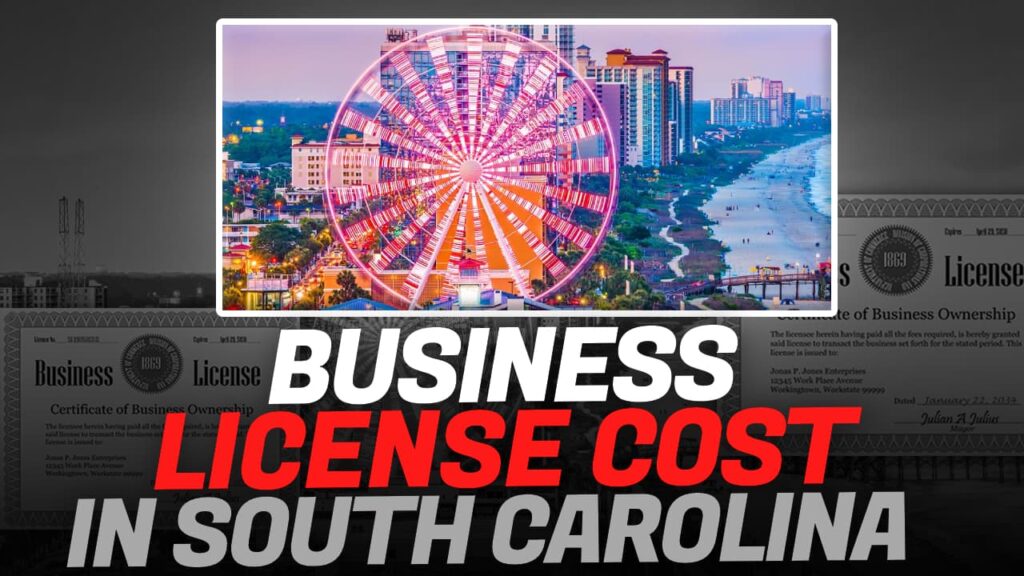In the vibrant business landscape of South Carolina, entrepreneurs and small business owners must navigate the crucial process of obtaining a business license. This comprehensive guide will walk you through the intricacies of securing the necessary permits to operate legally in the Palmetto State.

What is a Business License?
A business license is an official document that grants permission to conduct business within a specific jurisdiction. It serves as a regulatory tool for local and state governments to ensure businesses operate in compliance with relevant laws and regulations. In South Carolina, these licenses are essential for maintaining a legitimate and thriving business environment.
Why Do You Need a Business License in South Carolina?
Obtaining a business license in South Carolina is not just a legal requirement; it’s a fundamental step in establishing a reputable and compliant enterprise. Here are some key reasons why you need a business license:
- Legal Compliance: Operating without a proper license can result in fines and penalties.
- Consumer Trust: A licensed business demonstrates credibility to potential customers.
- Access to Resources: Many business support services and funding opportunities require a valid license.
- Tax Purposes: Licenses help track businesses for tax collection and revenue purposes.
According to the South Carolina Department of Revenue, approximately 95% of businesses in the state require some form of license or permit to operate legally.
Types of Business Licenses in South Carolina
South Carolina offers various types of business licenses, each tailored to specific business activities and locations. Understanding these categories is crucial for entrepreneurs looking to establish their presence in the state.
1. Local Business Licenses
Local business licenses are issued by municipal governments or county authorities. These licenses are typically required for businesses operating within city limits or unincorporated areas of a county. The requirements and fees for local licenses can vary significantly depending on the jurisdiction.
2. Statewide Business Licenses
Certain businesses need to obtain licenses from state-level agencies. These statewide licenses are often required for regulated industries or professions that have a broader impact across South Carolina.
3. Specialty Licenses
Specialty licenses are required for businesses engaged in specific activities or industries. These may include professional licenses, environmental permits, or industry-specific certifications.
Steps to Obtain a Local Business License in South Carolina
Securing a local business license involves several key steps. Follow this process to ensure you meet all requirements:
1. Determine Your Business Location
- Identify the exact location where your business will operate.
- Research the local licensing requirements for that specific area.
2. Check Zoning Requirements
- Contact the local zoning department to ensure your business activities are permitted in the chosen location.
- Obtain any necessary zoning permits or variances if required.
3. Complete the Application Form
- Obtain the business license application from your local city or county office.
- Provide accurate information about your business structure, activities, and ownership.
4. Pay the Required Fees
- Submit the application along with the required licensing fees.
- Fees often vary based on the type and size of your business.
Steps to Obtain a Statewide Business License in South Carolina
For businesses requiring statewide licensing, follow these steps:
1. Identify the Appropriate Licensing Agency
- Research which state agency oversees licensing for your specific industry.
- Common agencies include the Department of Labor, Licensing and Regulation and the Department of Health and Environmental Control.
2. Gather Necessary Documentation
- Collect all required documents, such as proof of insurance, educational credentials, or financial statements.
- Ensure all forms are completed accurately and thoroughly.
3. Submit Your Application Online or by Mail
- Many state agencies offer online application portals for convenience.
- Follow the submission instructions carefully and pay any associated fees.
Specialty Licenses and Permits in South Carolina
Certain businesses may require additional specialty licenses or permits. Some examples include:
- Food Service Permits for restaurants and catering businesses
- Alcohol Beverage Licenses for establishments serving alcoholic beverages
- Professional Licenses for occupations such as real estate agents, accountants, and healthcare providers
The South Carolina Department of Labor, Licensing and Regulationoversees more than 40 professional boards and commissions, regulating over 400,000 professionals in the state.
Renewal Process for a South Carolina Business License
Most business licenses in South Carolina require annual renewal. The renewal process typically involves:
- Reviewing and updating your business information
- Submitting a renewal application
- Paying the renewal fee
It’s crucial to mark your calendar and initiate the renewal process well before the expiration date to avoid any lapse in your license status.
Costs Associated with Obtaining and Renewing a Business License
The costs of business licenses in South Carolina can vary widely depending on factors such as:
- Type of business
- Location
- Annual revenue
- Number of employees
| License Type | Typical Cost Range |
|---|---|
| Local Business License | $50 – $300 |
| Statewide Professional License | $100 – $500 |
| Specialty Permits | $25 – $1,000+ |
Note: These figures are estimates and can vary significantly based on specific circumstances.
Common Mistakes to Avoid When Applying for a Business License
To ensure a smooth licensing process, avoid these common pitfalls:
- Incomplete Applications: Ensure all required fields are filled out accurately.
- Missing Documentation: Attach all necessary supporting documents.
- Incorrect Fee Payment: Double-check the required fees and payment methods.
- Ignoring Zoning Laws: Verify that your business location is properly zoned.
- Overlooking Specialty Licenses: Research any additional permits your specific business may need.
Resources and Support for Small Businesses in South Carolina
South Carolina offers numerous resources to support entrepreneurs and small business owners:
- Small Business Development Centers (SBDC): Provide free consulting and low-cost training services.
- South Carolina Department of Commerce: Offers business incentives and support programs.
- SCORE: Provides mentorship and workshops for small business owners.
- Local Chambers of Commerce: Offer networking opportunities and community resources.
According to the U.S. Small Business Administration, small businesses make up 99.4% of South Carolina businesses, highlighting the importance of these support systems.
Frequently Asked Questions (FAQs) About Business Licenses in South Carolina
Q: How long does it take to get a business license in South Carolina? A: Processing times vary, but local licenses typically take 1-2 weeks, while state licenses may take 2-4 weeks.
Q: Can I operate my business while my license application is pending? A: It’s generally not recommended to operate without a license. Consult with the licensing authority for guidance on your specific situation.
Q: Are there any businesses exempt from licensing requirements in South Carolina? A: While most businesses require some form of licensing, certain home-based businesses or very small operations may be exempt. Always check with local authorities to confirm.
Q: What happens if I operate without a proper license? A: Operating without a license can result in fines, penalties, and potential closure of your business. It’s crucial to obtain all necessary licenses before commencing operations.
Q: Can I transfer my business license if I move locations? A: In most cases, you’ll need to apply for a new license if you change locations, especially if moving to a different city or county.
By following this comprehensive guide, entrepreneurs can navigate the business licensing process in South Carolina with confidence. Remember to stay informed about any changes in licensing requirements and to maintain open communication with relevant licensing authorities throughout your business journey.
Here are the business license costs in other states:
